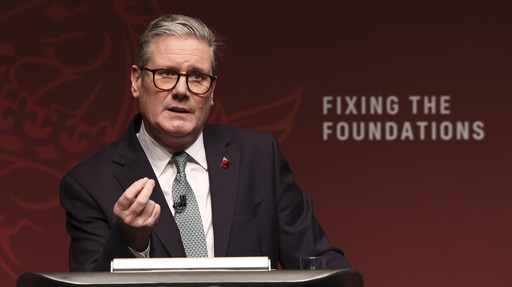
LONDON — Prime Minister Keir Starmer acknowledged on Monday that revitalizing Britain’s struggling economy will take considerable time and effort within a challenging fiscal landscape. He is preparing for his administration’s first high-profile budget announcement set for later this week.
Starmer aims to persuade the electorate that increased taxation and restricted public spending are essential measures to “rebuild the foundations” of an economy he attributes to years of decline under Conservative rule. However, his assertion—that gradual improvements will occur—poses a considerable risk in the fast-paced realm of politics.
“We must confront the cold truth of fiscal constraints,” Starmer stated, cautioning voters that politicians should refrain from misleading them with superficial solutions.
“I will not stand here and tell you to feel better, if you do not truly feel that way,” he remarked during an address in Birmingham, on the eve of the budget announcement. “Change needs to be tangible.”
Starmer’s Labour Party won the election on July 4, promising to eliminate the years of distress and controversy stemming from Conservative leadership, rejuvenate the British economy, and restore compromised public services, particularly the National Health Service.
Allocating funding to health care, education, and other public services is further complicated by stagnant economic growth, evident in an increase of public debt and a mere 0.2% growth rate noted in August. Starmer also revealed he inherited a £22 billion ($29 billion) gap in public finances from the preceding Conservative government.
In contrast, Conservative officials argue that they left behind an economy that, albeit sluggish, was growing with lower debt levels and a smaller deficit than many other nations in the Group of Seven.
Paul Johnson, the director of the independent Institute for Fiscal Studies, acknowledged the reality of the budget deficit but criticized both Labour and Conservatives for their misleading representations of the economy during the campaign.
“It was clear that they either needed to reduce spending—which was the previous government’s plan—or raise taxes,” he stated in an interview. “However, no party dared to say so, which is why we referred to it as a conspiracy of silence at that time.”
This indicates tax increases are inevitable in the upcoming budget, even though Labour maintains it will not place a heavier tax burden on “working people,” a definition that has sparked significant debate lately.
Treasury Chief Rachel Reeves, notable for being the first female chancellor of the exchequer, is anticipated to adjust the government’s debt rules to allow for increased borrowing to invest in health care, education, transportation, and other major infrastructure projects. She may propose raising taxes on employers without affecting employees, and potentially increasing capital gains taxes arguing that these do not constitute main sources of income for working individuals.
Starmer emphasized that “increasing taxes will avert austerity and enable the revival of public services,” while “borrowing will stimulate long-term growth.”
“There are no shortcuts,” he asserted.
The government introduced its stringent economic strategy soon after coming to power, stripping millions of seniors of a winter payment intended to help cover heating costs. This move was aimed at showcasing a willingness to make difficult choices, but it sparked considerable criticism from Labour supporters and various segments of the public.
This backlash coincided with reports that Starmer accepted significant monetary gifts in the form of designer items and concert tickets. Following several days of negative press, he ultimately agreed to repay £6,000 (almost $8,000) in benefits received.
Amidst this turmoil, stories about internal Labour conflicts and the “Swiftgate” saga proliferated, as anticipation built for the budget, which is notably being introduced nearly four months post-election—an unusually prolonged wait.
“Labour seems to be grappling with the transition into governance,” commented Jill Rutter, a senior fellow at the Institute for Government. “There’s a sense that everyone is essentially waiting for the budget announcement.”
Starmer has a reputation for caution, and Reeves, with her background at the Bank of England, seeks to establish herself as a careful steward of the nation’s finances. Rutter noted that the slow lead-up to the budget is likely influenced by the chaotic economic situation instigated by former Prime Minister Liz Truss in October 2022, who resigned after only 49 days due to her tax cut plans that destabilized the financial markets.
“Every chancellor is now haunted by the specter of Liz Truss,” Rutter remarked, adding that Reeves was determined to avoid a hasty approach.
“The question remains whether she will execute her duties effectively enough on Wednesday that the public feels she has made good use of this time,” Rutter concluded. “The stakes are considerably high for the government.”
